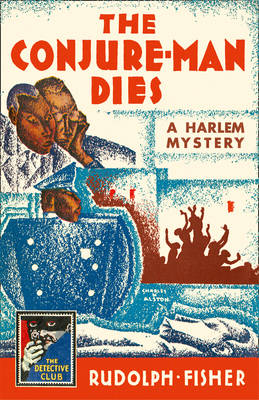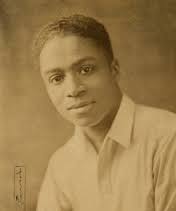 The Golden Age of detective fiction coincided with a different sort of Golden Age among African-Americans: The Harlem Renaissance. Arguably no-one could have been described better as a Renaissance Man, than Rudolph Fisher, the author of The Conjure-Man Dies. A graduate of Brown University and Howard University Medical School, he was the author of scientific papers and political tracts promoting Pan-Africanism, as well as at least two novels and several short stories, all within the unbelievably short life-span of 37 years.
The Golden Age of detective fiction coincided with a different sort of Golden Age among African-Americans: The Harlem Renaissance. Arguably no-one could have been described better as a Renaissance Man, than Rudolph Fisher, the author of The Conjure-Man Dies. A graduate of Brown University and Howard University Medical School, he was the author of scientific papers and political tracts promoting Pan-Africanism, as well as at least two novels and several short stories, all within the unbelievably short life-span of 37 years.
Fisher was not the first black author of a detective story. That distinction goes to the Jamaican-American writer W. Adolphe Roberts for The Haunting Hand (1926). (Quite a character in his own right, Roberts had love affairs with women as diverse as Margaret Sanger and Edna St. Vincent Millay, although the second may have been purely literary.) But Fisher’s novel was the first to introduce a black detective – along with a completely black cast of characters.
As he did in his first novel, The Walls of Jericho, Fisher self-consciously strove to portray both the upper classes and lower classes in Harlem equally. Thus, his hero, Dr. John Archer, “a tall, slender light-skinned man of obviously habitual composure,” and N’Gana Frimbo, the Conjure-Man, a Harvard-educated African prince who pencils notes such as “Fairclough, too has missed the great secret,” in a text titled The Philosophical Basis of Destiny, are balanced by Bubber and Jinx, who discover the body when they “jes’ come to get this Frimbo’s advice ‘bout a little business project we thought up.” In between these polar opposites stand Frimbo’s landlord and his wife, a railroad porter, Easley Jones, and Perry Dart, the police detective, who, unlike the usual bumbling police officers in Golden Age stories, “knew Harlem from lowest dive to loftiest temple.”
Perhaps not unexpectedly in such a rigidly-defined society, gradations in skin color play an important role in solving the mystery. Overall, however, The Conjure-Man Dies destabilizes epistemological and social norms rather than reinforcing them. The line between the rational and irrational is constantly blurred, culminating in the man of science, Archer, saying to Dart, “Frimbo would call me a mystic. I have implicit faith in something I really can’t prove.” Bubber and Jinx provide a comic reworking of this same debate between mysticism and detective work; however, they are the ones who actually solve the mystery by discovering the proof Archer cannot.

Perhaps most ambiguous of all is the figure of the railroad porter, a job that was at once a demeaning reminder of slavery and crucial to the dissemination of black culture (especially music) and the rise of the black middle class. Fisher shows how a similar dichotomy drives Archer’s life in a passage that is worth quoting at length:
“[My father] died shortly after I finished college. I wanted to study medicine. One of my profs had a wealthy friend. He saw me through. I’ve been practicing nearly ten years – and haven’t finished paying him back yet. Hardly dramatic, is it?’
“You have omitted the drama, my friend. Your father’s struggle to educate you, his clinging on to life just to see you complete a college training – which had been denied him; your desperate helplessness, facing the probability of not being able to go on into medicine; the impending alternative of teaching school in some Negro academy; the thrill of discovering help; the rigid economy, to the keep the final amount of your debt as low as possible – the summers of menial work as a bell boy or waiter or porter somewhere, constantly taking orders from your inferiors both white and black.”
Beyond being a stinging social commentary, the passage is also a brilliant apologetic for writers giving voice to characters and societies that are usually dismissed for being “hardly dramatic.” So read The Conjure-Man Dies not for its historical significance. Read it because it is a damned fine book.
 —Erica Obey
—Erica Obey
Erica Obey is the author of, most recently, The Lazarus Vector and The Curse of the Braddock Brides.

Nice piece, Erica. I love THE CONJURE-MAN DIES, and I think more people should know about it. You’re right in saying it’s a terrific mix of purely enjoyable whodunit mixed with social commentary. It also is notable for mixing the classic sort of Agatha Christie mystery form with aspects of the then-growing hard-boiled school. I’d be surprised if Fisher had not read some Dashiell Hammett by the time he wrote this book. All that set in a purely African-American context in Harlem. Fascinating. He caught some flack, by the way, during his time, from writers such as Langston Hughes for NOT showing African-Americans in the most admirable ways at all times in his work — something else that’s noteworthy. Fisher presents people more as they are than as they should be, and he points to Chester Himes and his Harlem detective novels in this regard. Anyway, just hope that more people come to discover him.
Thank you, Scott, for such an informative, informed response. For anyone else who is interested in learning more about this fascinating book, Scott has written far more extensively about THE CONJURE-MAN DIES than I have, and I urge you to check out his article at https://lareviewofbooks.org/article/elementary-dear-harlem-on-the-first-african-american-detective-novel